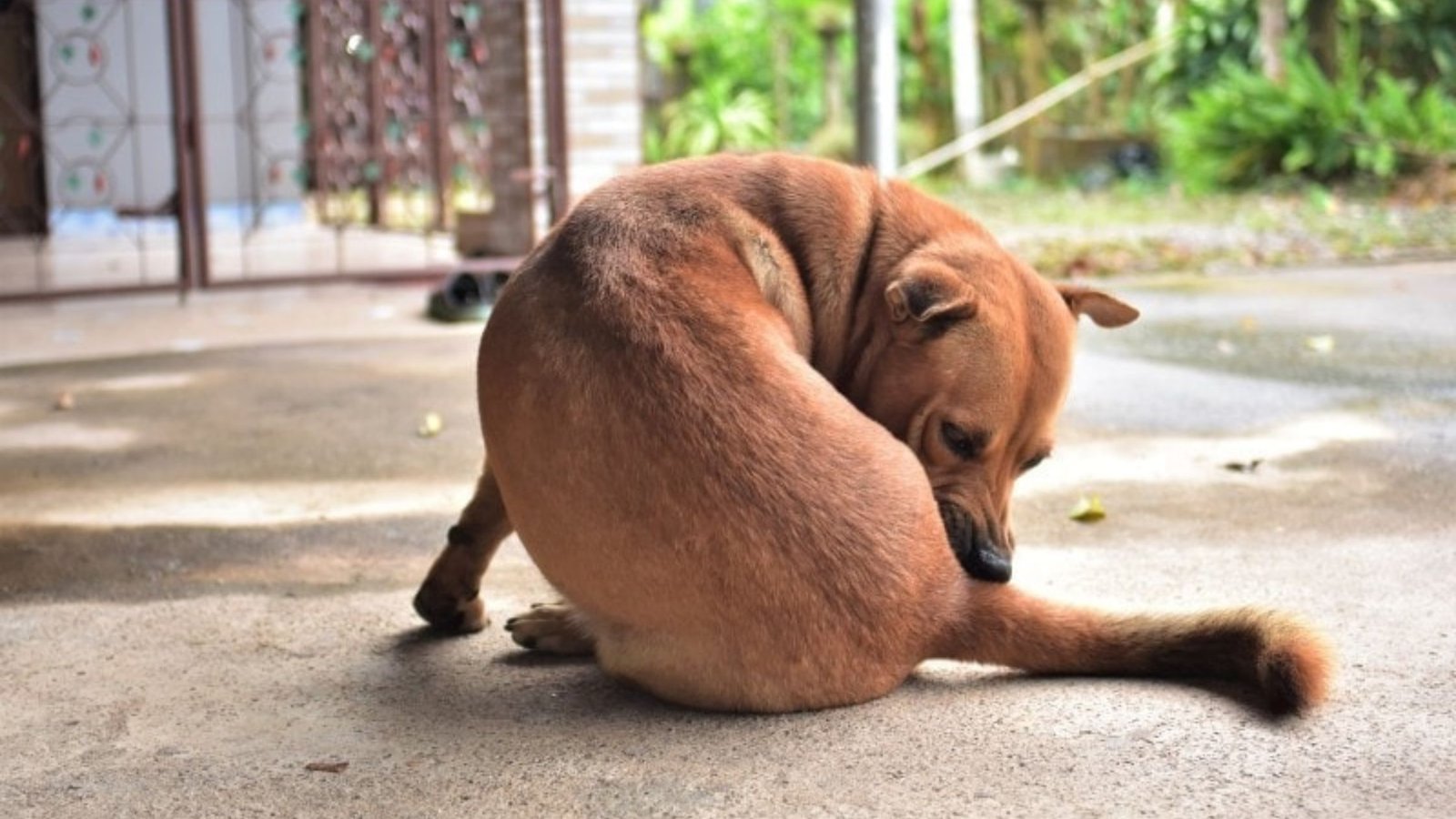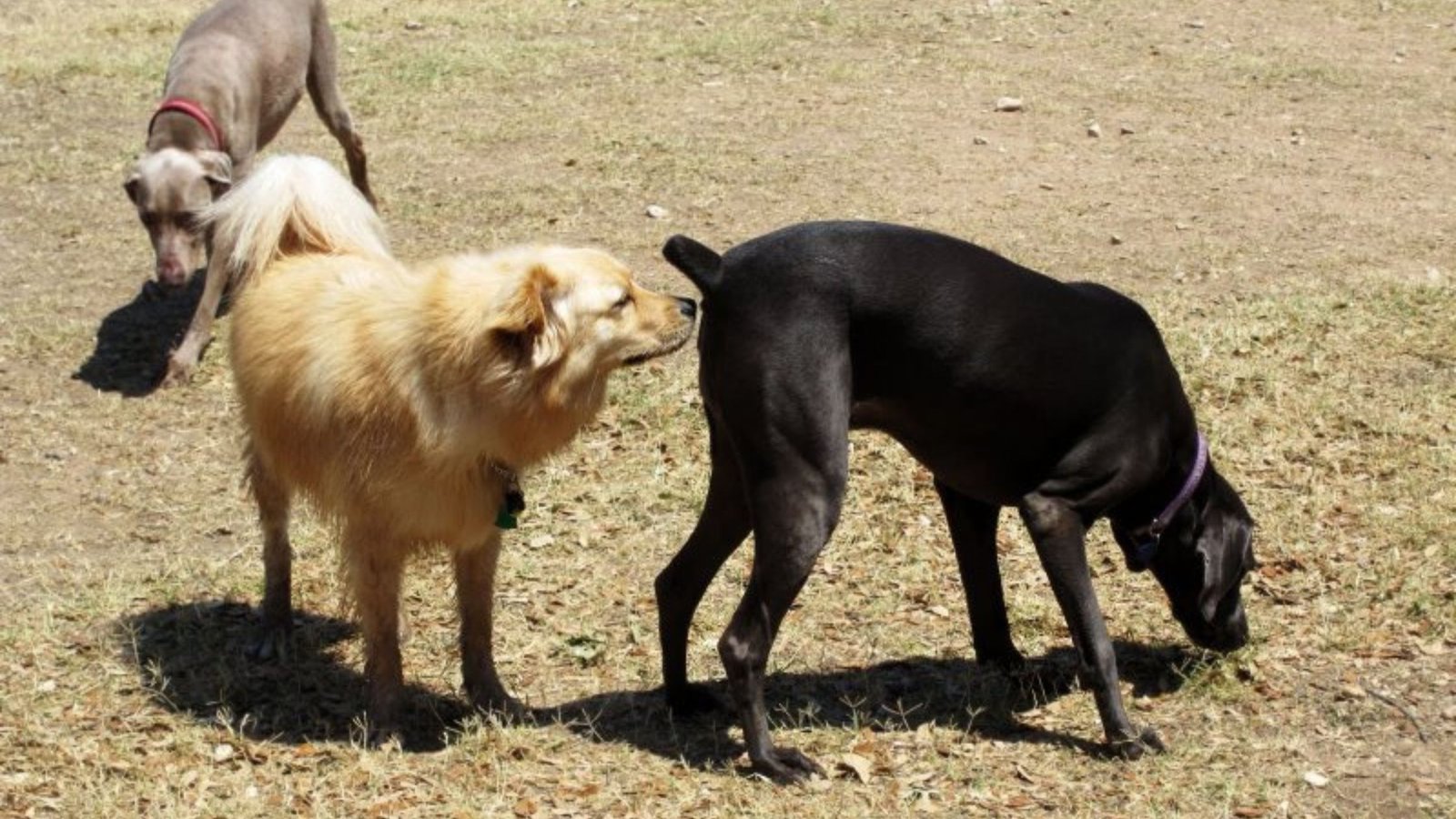Dogs, with their endearing and sometimes perplexing behaviors, can leave pet owners scratching their heads. Excessive butt licking is one such behavior that can be both puzzling and concerning. So why do dogs lick their butts?

UNDERSTANDING THE REASONS WHY DO DOGS LICK THEIR BUTTS
In this guide, we will delve into the reasons behind this behavior, offering insights into why dogs engage in excessive butt licking and providing effective strategies to address and prevent it. Dogs are meticulous groomers, and licking, including around the anal area, is a part of their self-cleaning routine. Recognizing what constitutes normal grooming behavior versus excessive licking is the first step in addressing this concern.
Dogs Anal Gland Issues | Dogs Allergies and Skin Irritation
Excessive butt licking may indicate problems with the anal glands. These small sacs can become impacted or infected, leading to discomfort and a heightened urge to lick. Identifying and addressing anal gland issues is crucial for resolving this behavior. In cases of persistent anal gland issues, professional expression by a vet may be necessary. This procedure alleviates discomfort and reduces the urge to excessively lick the anal area.
Allergies or skin irritation, particularly around the anal region, can trigger excessive licking. Understanding and addressing the root cause, whether it be allergies or irritation, is essential for effective management.

EFFECTIVE WAYS TO STOP EXCESSIVE BUTT LICKING
Regular Dog Grooming and Cleaning
Establishing a routine for grooming, including regular cleaning of the anal area, can significantly reduce the need for excessive butt licking. This practice promotes hygiene and helps prevent discomfort. A well-balanced diet is fundamental to your dog’s overall health, including anal health. Collaborate with your vet to make informed dietary changes that support anal gland health, minimizing the likelihood of excessive licking.
Use of Topical Treatments and Addressing Underlying Dog Allergies
Applying dog-friendly topical treatments or creams can soothe irritation and reduce the urge to lick. Opt for natural remedies that are safe for your dog and provide relief from itching or discomfort. Identifying and managing allergies through veterinary guidance is crucial. Allergy testing can pinpoint specific triggers, allowing for targeted treatment and preventing excessive butt licking.
Regular Vet Check-ups and Behavioral Training
Regular veterinary check-ups are vital for preventive care. These visits enable early detection of potential issues, allowing for proactive management and ensuring your dog’s overall well-being. Implementing positive reinforcement techniques can play a significant role in training your dog to engage in alternative behaviors. By reinforcing positive habits, you can reduce the likelihood of excessive butt licking.
VET-APPROVED STRATEGIES TO CURB EXCESSIVE DOG LICKING
Dogs are renowned for their curious habits, but when excessive licking becomes a concern, it’s time to seek professional advice. In this comprehensive guide, we’ll explore the reasons behind a dog’s penchant for licking everything and provide vet-approved strategies to curb this behavior.
Normal Dog Behavior | Potential Health Issues | Stress and Anxiety
Dogs use licking as a means of communication and exploration. Understanding the line between normal behavior and excessive licking is crucial for pet owners. Excessive licking can be a symptom of underlying health issues. Vet evaluation is essential to rule out medical conditions that may contribute to this behavior. Dogs may resort to licking as a coping mechanism for stress or anxiety. Identifying and addressing the root cause is vital for effective intervention.
Comprehensive Vet Examination | Behavioral Consultation
A thorough examination by a veterinarian is the first step. This helps rule out any medical issues and provides insights into the specific triggers for your dog’s excessive licking. Seek guidance from a veterinary behaviorist to address underlying behavioral issues contributing to excessive licking. A tailored behavior modification plan can make a significant difference.
Dietary Adjustments | Environmental Enrichment | Anti-Lick Products
Dietary factors can contribute to licking behavior. Collaborate with your vet to make informed dietary changes that support overall well-being and may reduce excessive licking tendencies. Enrich your dog’s environment with toys, puzzles, and activities to alleviate boredom and reduce stress-induced licking. Vet advice can guide you in creating a stimulating environment. Explore vet-approved anti-lick products such as bitter sprays or cones. These can deter licking and provide a safe and effective means of behavior modification.

PREVENTIVE MEASURES FOR LONG-TERM SUCCESS
Follow-up Vet Visits | Positive Reinforcement Training
Regular vet follow-up visits are crucial for monitoring progress and adjusting the intervention plan as needed. Consistent communication with your vet ensures a tailored approach for your dog’s unique needs. Vet-recommended training techniques, coupled with positive reinforcement, can redirect your dog’s behavior. Consistency is key, and your vet can guide you in implementing effective training methods.
Excessive licking in dogs requires a thoughtful and vet-guided approach for effective intervention. By understanding the reasons behind the behavior and implementing vet-approved strategies, you can curb your dog’s excessive licking tendencies and ensure their overall well-being. Persistent or severe licking warrants consultation with a veterinarian for accurate diagnosis and tailored treatment.
Prevent Excessive Butt Licking in Dogs
With the right vet-approved strategies, you can address excessive licking, provide a happy and healthy life for your furry friend, and enjoy a lick-free environment. Trust in vet advice, and let your dog thrive in a behaviorally balanced and contented state. Addressing excessive butt licking in dogs requires a multifaceted approach, combining regular grooming, dietary considerations, and veterinary guidance.
By understanding the reasons behind this behavior and incorporating preventive measures, you can ensure your dog’s comfort and well-being. Remember, persistent or severe butt licking warrants consultation with a veterinarian for accurate diagnosis and tailored treatment. With the right approach, you can keep your dog’s hygiene in check and enjoy a happy, healthy, and lick-free furry companion. Embrace these solutions, and let your dog’s well-being shine!
WHY DOGS LICK THEIR BUTTS AND OTHER DOGS’ BUTTS
Dogs are fascinating creatures with a myriad of behaviors that can both captivate and perplex their human companions. One such behavior that often leaves pet owners curious is the act of dogs licking their own buttocks or the buttocks of other dogs. Let’s uncover more of the reasons behind this behavior, touching on evolutionary roots, communication through licking, grooming instincts, and addressing common concerns. Join us on a journey to demystify the intriguing world of why dogs engage in the behavior of licking their butts and other dogs’ butts.
The Dog Licking Instinct
Evolutionary Roots: Understanding the Inherited Dog Behavior
To comprehend why dogs have a tendency to lick their own or other dogs’ buttocks, it’s crucial to delve into the evolutionary roots of this behavior. Dogs have inherited instincts from their wild ancestors, where such behaviors served vital functions in their natural habitats. The act of butt licking was a means of communication, establishing hierarchy, and ensuring the cohesion of the pack.
Communication Through Licking: Unraveling Dogs Social Dynamics
Dogs communicate using various methods, and licking is a significant form of expression. Butt licking is intertwined with dog social dynamics, conveying messages related to hierarchy, submission, and the establishment of bonds within a pack. When a dog licks another dog’s butt, it’s not merely a grooming act but a nuanced form of communication that strengthens the social fabric of the group.

Dog Health and Dog Grooming
Grooming Instinct: The Role in Maintaining Dog Cleanliness
Dogs are known for their meticulous grooming habits, and licking is a fundamental aspect of their self-cleaning routine. Butt licking is a part of their grooming instinct, ensuring hygiene and preventing potential health issues. By licking their own buttocks, dogs maintain cleanliness, preventing matting of fur and the accumulation of dirt and debris.
Anal Gland Expression: Addressing Potential Discomfort
Another aspect tied to butt licking is the expression of anal glands. Anal glands play a crucial role in a dog’s health, and licking the area can be a way for dogs to address potential discomfort. It’s essential for pet owners to be attentive to signs of anal gland issues, such as scooting or excessive licking, and seek veterinary attention when necessary.
Common Concerns and Misconceptions
Parasites and Infections: Dispelling Myths and Providing Insight
Concerns about parasites and infections often arise when it comes to butt licking. However, it’s crucial to dispel common dog health misconceptions and provide insights into the minimal risks associated with this behavior. While it’s true that parasites can be present, the risks are generally low, and vigilant pet owners can take preventive measures.
Dog Training and Management: Shaping Dog Behavior Positively
For pet owners seeking to manage or redirect butt licking behavior, positive training techniques play a crucial role. Positive reinforcement, using treats or praise when dogs exhibit desirable behavior, can help shape their actions. Deterrents can also be used to discourage unwanted licking, and seeking professional guidance in dog training is an option for more challenging cases.
Social Dynamics in Multi-Dog Homes
Butt Licking in Multi-Dog Homes: Fostering Harmony in Interactions
In households with multiple dogs, butt licking interactions can be complex. Understanding the dynamics of butt licking in multi-dog homes is essential. It is often related to pack behavior, and pet owners can promote harmony by providing ample opportunities for positive interactions, ensuring that each dog feels secure and valued within the pack.
Brief sum up on why do dogs lick their butts
While the act of dogs licking their own or other dogs’ buttocks might seem peculiar to human observers, it’s a behavior deeply rooted in dogs instincts, social dynamics, and health maintenance. By demystifying the reasons behind butt licking, pet owners can develop a more comprehensive understanding of their dogs’ behaviors, fostering a stronger bond and promoting their well-being. So, the next time you witness your furry friend engaging in this behavior, you can approach it with knowledge, empathy, and a nuanced understanding of the multifaceted world of dog communication and grooming. Hopefully we showed you the reasons why do dogs lick their butts.
If you want to learn more on this topic, we recommend to continue reading on HEALTHY DOGGOS BLOG!



